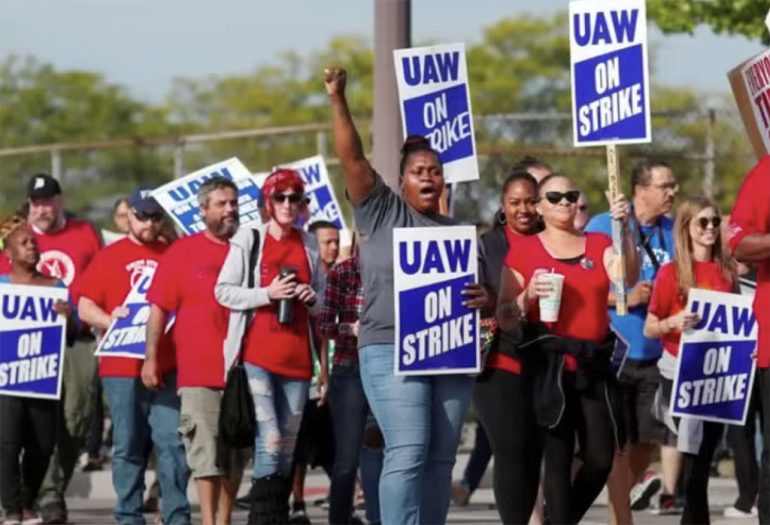
General Motors (GM) and Stellantis, the parent company of Chrysler, find themselves as holdouts in ongoing negotiations with the United Auto Workers (UAW) to end a protracted six-week strike. This situation unfolded just a day after Ford Motor successfully reached a tentative contract agreement, marking the first of the Big Three automakers in Detroit to do so. The deal struck by Ford may set the tone for forthcoming negotiations with GM and Stellantis.
On Thursday, the UAW engaged in discussions with both GM and Stellantis, with both sides working diligently to reach an agreement. Insider sources suggest that GM and the UAW have made considerable progress on economic matters. Notably, GM’s CEO, Mary Barra, and UAW President Shawn Fain actively participated in these negotiations, raising hopes that a deal might be on the horizon, possibly as early as that evening, though nothing was set in stone.
The Ford agreement, while awaiting ratification by union members, includes a substantial 25% wage increase over the 4.5-year contract term, increased retirement contributions, and the elimination of lower pay tiers for certain parts operations workers at Ford. Additionally, it reduces the time required to reach top pay from eight years to three, and it grants the UAW the right to strike over plant closures.
Ford’s Chief Financial Officer, John Lawler, highlighted the cost of the strike, estimating it at $1.3 billion in lost earnings and 80,000 unsold vehicles. He acknowledged that restarting the three idled assembly plants would be a complex process and predicted that the labor deal would increase labor costs for U.S. production by approximately $850 to $900 per vehicle.
The UAW informed Ford workers that they should return to work before the contract’s ratification. This agreement represents a significant victory for labor, in a year when labor strikes and threats of strikes have been prominent across various industries, including rail, entertainment, shipping, and casinos.
However, an important unresolved issue pertains to the fate of battery plant workers, a topic not addressed in the deal announced by the UAW on Wednesday. Previously, Ford CEO Jim Farley accused the UAW of holding the labor agreement hostage to pressure Ford into providing the same top wages for workers at new battery plants as those at assembly plants.
This agreement marks a reversal of concessions made by the UAW in contracts dating back to 2007 when GM and Chrysler were facing bankruptcy, and Ford was struggling to stay afloat. Still, the compensation package falls short of the UAW’s initial demands, which included a 40% pay hike, a 32-hour workweek, and the reinstatement of defined benefit pensions.
The automakers argue that excessive pay increases would undermine their competitiveness in the face of lower-cost manufacturers, including industry leader Tesla. In terms of total pay hikes, factoring in compounding and cost-of-living adjustments, the UAW contends that the deal amounts to an increase of more than 33%.
UAW President Shawn Fain expressed his optimism about the agreement, acknowledging that it would break records and change lives. However, he emphasized that the next steps depended on the union members.
In response to the agreement’s tentative nature, the UAW has instructed Ford workers currently on strike to return to their jobs while the ratification process unfolds. This move signals the potential restart of production for Ford Super Duty pickups, Bronco and Explorer SUVs, and Ranger trucks in the coming week. Ford’s CEO, Jim Farley, expressed his satisfaction with the tentative labor agreement, underscoring its coverage of Ford’s U.S. operations.
Source: Reuters

Lloyd Tobias is a seasoned automotive journalist and passionate enthusiast with over 15 years of experience immersed in the world of cars. Whether it’s exploring the latest advancements in automotive technology or keeping a close pulse on breaking industry news, Lloyd brings a sharp perspective and a deep appreciation for all things automotive. His writing blends technical insight with real-world enthusiasm, making his contributions both informative and engaging for readers who share his love for the drive. When he’s not behind the keyboard or under the hood, Lloyd enjoys test driving the newest models and staying ahead of the curve in an ever-evolving automotive landscape.